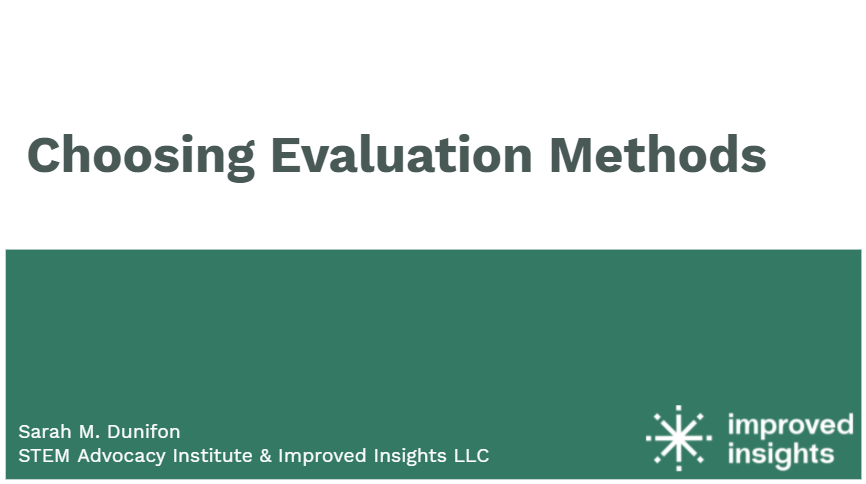
Insights
Deep Dive: 21st Century Skills
This blog post does a deep dive into the concept of 21st century skills, including what this concept is, how it might be incorporated into your program outcomes, and how evaluators think about assessing it.
Deep Dive: STEM Engagement
This blog post does a deep dive into the concept of STEM engagement, including what this concept is, how it might be incorporated into your program outcomes, and how evaluators think about assessing it.
Science Communication is Not Just for Scientists
This blog post discusses science communication and its intersection with informal STEM education and evaluation.
Preventing Learning Loss through Informal Education
This blog post discusses the learning loss phenomenon and proposes informal learning as a way to build up students’ STEM interests and abilities.
Deep Dive: STEM Identity
This blog post does a deep dive into the concept of STEM identity, including what this concept is, how it might be incorporated into your program outcomes, and how evaluators think about assessing it.
New Publication: Impacts of a Near-Peer Urban Ecology Research Mentoring Program on Undergraduate Mentors
New publication in Frontiers in Ecology and Evolution: Impacts of a Near-Peer Urban Ecology Research Mentoring Program on Undergraduate Mentors.
What Approaches Are There to Conducting Evaluations?
We’re chatting about evaluation approaches for informal STEM learning.
Data Literacy at Eco.Logic
We’re chatting with STEM practitioners around the country to understand how they are engaging with data literacy in their spaces. For this interview, I’m sitting down with Rozina Kanchwala, Founder and Executive Director at Eco.Logic, an education, arts, and community building non-profit that inspires people to take tangible action to address climate change.
What Can We Measure in Informal STEM Learning?
We’re chatting about informal learning and measurement in STEM.
Data Literacy at the Leonard Gelfand STEM Center
We’re chatting with STEM practitioners around the country to understand how they are engaging with data literacy in their spaces. For this interview, I’m sitting down with Max Herzog, a Program Manager at the Cleveland Water Alliance (CWA).
Data Literacy at the Cleveland Water Alliance
In an effort to understand how STEM practitioners around the country are engaging with data literacy in their space, we’re launching a series of interviews. First, I’m sitting down with Jim Bader, the Executive Director of the Leonard Gelfand STEM Center at Case Western Reserve University.
The Greater Sum Foundation: Evaluating Your Impact
Learn about the difference between evaluation and research, how to begin evaluating your impact, and why evaluating impact is so important for nonprofit organizations in this lecture for The Greater Sum Foundation.
Outcomes in STEM Besides Achievement
Outcomes beyond academic achievement - like science interest, science identity, and 21st Century Skills - can be important for STEM learning and persistence.
Protecting Participants with Confidential and Anonymous Data
Learn the difference between anonymous and confidential data, plus when - and how - to collect each.
Choosing Evaluation Methods
Get an inside view on how we go about choosing evaluation methods that suit your audience.
Planning for Impact through Evaluation
Hear from Principal Evaluator Sarah M. Dunifon on “Planning for Impact through Evaluation” for STEM Advocacy Institute
Evaluating Your Impact with Sarah M. Dunifon
Hear from Principal Evaluator Sarah M. Dunifon on “Evaluating Your Impact” for The Greater Sum
Why Active Listening is Key for Evaluation Meaning-Making
As evaluators, we’re meaning-makers, truth-uncovers, and question-askers for not only the organization itself, but for all the stakeholders involved as well. It’s only through active listening that we’re able to gain meaning and provide the necessary insights.





















